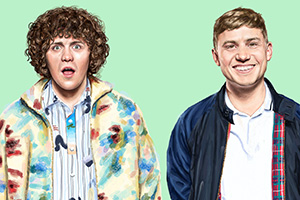Series 2 interview
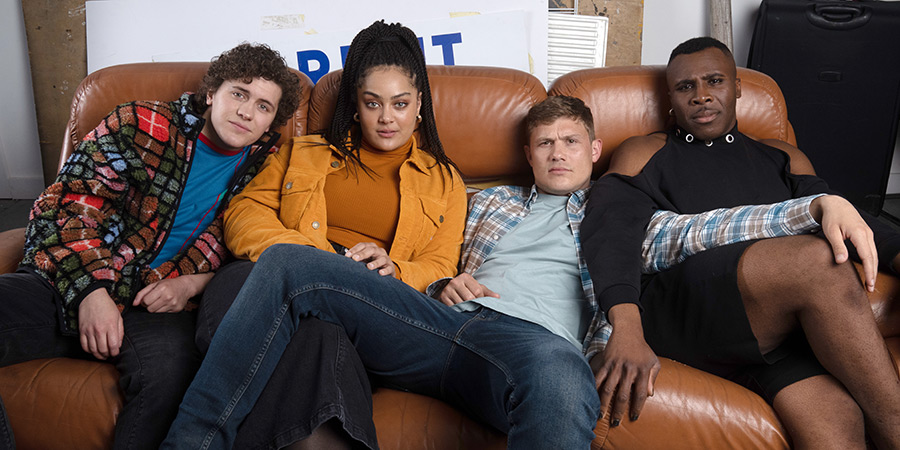
Jack Rooke talks about writing the second series of Big Boys, and we hear from cast members Dylan Llewellyn, Jon Pointing, Izuka Hoyle and Olisa Odele.
Jack Rooke
What is Big Boys?
Big Boys is a semi-autobiographical comedy, where I'm trying to make a sweet show about friendship with some bitchy, funny, and catty jokes and an underlying feeling of why family and chosen family is so important and how friends can often become just as important as family members. And how when you're trying to learn about yourself, sometimes it's nice to choose the people who go on that experience with you and help you to define and become who you are.
How did you find the response from Series 1? Was there anything that surprised you or made you see the show in a different way?
I always knew if I could find a channel that were going to support the show and let me write the jokes that I wanted to write and let me have the niche references to Gamu from The X Factor and Alison Hammond as a fish, and if they had the confidence to not just see Big Boys as just a gay show or just a mental health show - Channel 4 were so amazing at understanding the whole show and all the different types of representation within the mix.
I always felt like I was backing a strong horse, but I definitely did not expect for the response critically to be as good as it was and then to have six BAFTA nominations for a Series 1! I love when people I've really admired in comedy are writing about their love for the show but really my favourite reaction is just from geezers that are so happy to see themselves in Danny, whether it's those sorts of struggles being articulated in a way that's funny, and not just drenched in a kind of trauma porn.
I think that to me is always the nicest thing when somebody says "oh, my husband really liked it" or "my male straight friends really got it", because I never want to limit myself as somebody who just writes about the gay experience, I want it to be as broad and open as possible. And I think Series 2 comes off the back of all of that lovely reaffirming praise for Series 1 where I've just tried to make it bigger and better and more inclusive than ever.
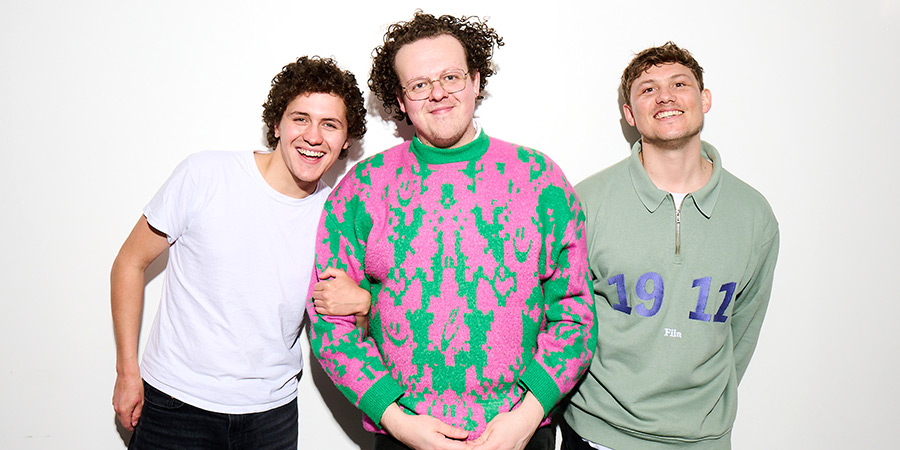
Big Boys is so universal in dealing with real topics - from broken homes to grief and everything in-between, how do you instil comedy into those moments?
I'm a real sitcom, comedy drama fan. Growing up me and my dad would just constantly watch sitcoms, whether that be Father Ted, or The Vicar Of Dibley or Only Fools And Horses. Comedy was such a huge part of my cultural experience growing up, I never went to the theatre. I never watched plays, or opera or dance or never went to art galleries, never went to museums, but I saw every sitcom. And to me that's just as culturally important and relevant, and I felt like it's such a good space to bring difficult topics into the forefront and to bring things that are almost quite polarising.
For me, when I went through losing my dad, I certainly felt like there wasn't much stuff that I could watch where I felt like I could really relate to that experience. I felt like the only rule I really had with Big Boys was that if I was going to do something that was very emotionally charged, or potentially dealing with traumatic themes, that there still had to be loads of jokes in there. That for every sad moment, it had to have a massive gag after it, because I still want to write a comedy.
We get to see a lot more from the other characters in this series, what made you expand on their stories?
In Series 2, I've written up the character of Cousin Shannon, played by Harriet Webb, because for me, it was really important that there was one character in their 20s who didn't go to uni, and who wasn't pursuing higher education but was still just as ambitious even when they're starting a family and having a baby. Like so many working-class women in my life who've helped bring me up and who have played a huge part in you know, even my cultural heroes, there are women that weren't necessarily afforded the opportunity to go to uni, but still had phenomenally successful lives. And for me, it was just very important to have a character like Shannon in the mix, who is maybe Danny's age, and is just pursuing a different route to getting her goals. I wanted to write a working-class funny woman who's still daft and still mad and still saying outrageous stuff, but ultimately has a bit of drive and a bit of determination to her. I really wanted that other option in life to not go to uni to be just as valid as the people who do.
The same with Laurie. When we were filming the scenes with Ian Burfield and Harriet they had such good chemistry. I mean, Harriet can literally have chemistry with a glass of water. She is such a phenomenal, comedic and dramatic actor, and the chemistry between her and Laurie was so nice. It really made me cry because it just took me back to losing my dad and realising that my dad was obviously my parent, but to my cousins and to my friends, and to loads of other people he was such a paternal figure. And for me, it was really lovely to watch him say things like you're a go getter, you're beautiful and to have all of that reaffirming stuff.
Who were you most excited about developing?
Dylan and Jon did such a phenomenal job with Jack and Danny in Series 1. I didn't just want to repeat the same dynamic. I felt like we had such brilliant supporting cast and supporting actors and I wanted to build those stories. Olisa is such a brilliant, quite iconic queer comedy actor. He's played parts in Chewing Gum and Am I Being Unreasonable? and he really is a phenomenal talent. The character of Yemi was important to me because I wanted there to be one queer character that wasn't struggling and was talking from a place of emotional maturity.
Yemi comes in as a much more self-assured, queer person who's really ambitious and wants to have the best fashion collection at the uni. And then, with Corinne, it was very important to have a character in the mix who is clearly trying to play by the rules, but loves breaking them, and is really uptight and very sort of socially conscious, but really is just as much of a hypocrite as we all are. And to kind of laugh with that. I think Izuka is the only actor who wasn't in the pilot because I hadn't written the part of Corinne yet. When I started doing the series, I really struggled to find Corinne's voice and her place in the show - Izuka has made that character what Corinne is because she's an actor who really elevates everything on the page. And just like her character, let's say she wears the trousers. She tells the boys what to do.
I also want to mention Camille Coduri and Annette Badland who play Peggy my mum and Nanny Bingo because for me, they give such a beautiful portrayal of loss and grief and being women of a slightly older age who perhaps at times feel quite invisible, but they're so present. I really liked that about Peggy that she's trying to chat to other men and explore what her future might be because she's in her mid-50s. She has just as much of a future as the boys do, and as much as the uni gang. I think it's so important that we see characters of a certain age, having new first times because that is just reflective of life. And then something happens like grief or trauma, and you find out something different or you go on a different path to the one you thought you were on. I think Camille plays that so beautifully. And Annette Badland in episode six, I think gives maybe the performance of the series! I think she is one of the classiest actors I've ever worked with. I really feel like as a huge ensemble, I'm really proud of it. And of course, Katy Wix, she is one of the funniest people I've ever met, she just makes such a high impact anytime she is on screen.
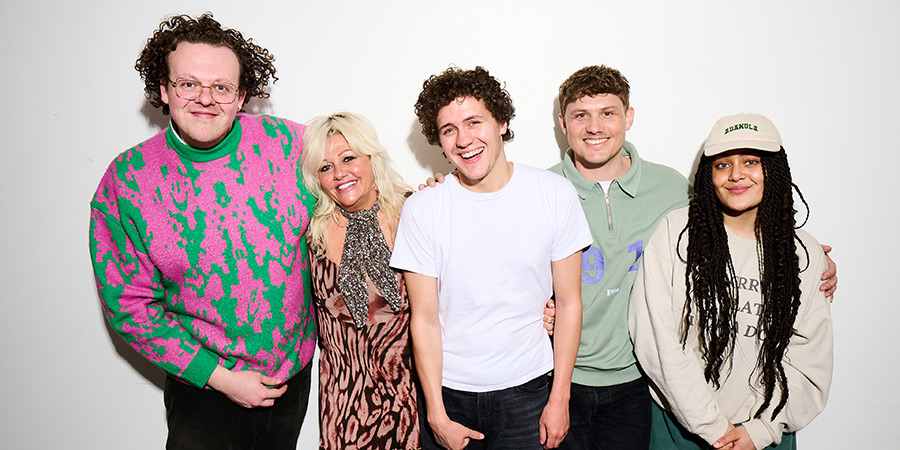
Was Series 2 something you considered when writing Series 1? Was it always a pipeline dream?
Series 2 is definitely a big dream because I've always felt in my career, a bit of a one trick pony, because I went to Edinburgh for the first time in 2015 with the show about grief, and then went again in 2017 with a show about grief and I just felt like I would get the odd kind of cheap shot or a little kind of dig being like "you just write about one thing". But, actually, it took quite a lot of courage and ambition to write something that I suppose could have been seen by 15-year-old me when my dad died and something that could be a tool to help young people going through those sort of mental health struggles and not even young people, but people of all ages.
Those experiences of grief and loss happen to people at all different ages. We have normalised it happening to people in their 30s to 50s but actually so much more it's happening to younger people. And when I say so much more it's always happened to young people but we've never culturally explored it and it's where I'm really proud of teenage me because when I was like 15 or 16, I just kept a diary on my computer of things that happened related to grief. And from at that point, it was just an emotional outlet. I found writing to be such a hugely cathartic escape. Then, when I was 18, I started writing funny, silly poems about grief and about my dad, and you know, come turning 26 I've made that into a TV series.
When I was a teenager in the midst of it all, I remember thinking like, no one's told a story like this about what it's like to lose someone at this age, and how it teaches you what mortality is at such a formative period of your life that does shape how you then become an adult. It shapes your relationships and your friendships. It makes you cherish people so much more. And it does make you realise the importance of chosen family, which I think is ultimately the theme of Series 2, these people who are all kind of misfits, who shouldn't necessarily all like each other, but who just find a really deep affinity and love and care. I've been so chuffed at how broad the response has been.
So, Series 2 was always a bit of a pipe dream and I'd like to write more. I feel like I have taken these stories from literally performing them above pubs in little theatres. That journey to me is something I'm incredibly proud of and it's made me feel like it was worth it.
A lot of the first series is based around your own experiences how much does Series 2 deviate from that?
I think Series 2 is still heavily drawn from my own life. There's definitely stuff that's very fictionalised and that's the stuff I really enjoy. Writing is coming up with new sort of storylines or new kind of exciting adventures, but a lot of the stuff that I think resonates with people, it's the stuff that's real, like, you know, I did live with someone who was webcamming to make money and I'm very sex worker positive and so it's fun to try to write that sensitively but make it really funny because it is funny.
Even the work experience stuff I used to work on a youth phone in radio show when I was in my early 20s, and we used to get mad people calling up. Then there's the blue shed which is based on the property guardianship I lived in. In most of my 20s it was the only way I could afford to live in London. So that blue shed stuff is kind of drawing on communal living and non-house environments where everything's kind of falling apart, there's never any space for anything and there is a table tennis table in the middle of the hallway and that sort of madness. So, a lot of its drawn from personal experience still, but it is fun for me to come up with other narratives. I really love that Big Boys is a sort of 50/50 drawn from real life but also just a creation of fumbling around.
We get a few more cameos from you, what is the story behind that?
The whole narrator device is directly taken from my 2017 Edinburgh show, where I spoke to the audience as 'you'. For me, it's looking back at something nostalgically and I like having a narrative device that's quite ambiguous. The narrator to me is often the function of the things that sometimes we wish we had said or realised at the time. When you get to your late 20s or early 30s, you're like, ah, yeah, I wish I had said that. I wish I'd recognised that behaviour, I wish I'd pulled somebody up on this thing or I wish I'd been a bit more there for this.
What is your favourite line from the show?
'I for one will not be calling her Cheryl Fernandez Versini' - there's so many, but all my favourites are Shannon or Jules lines.
Dylan Llewellyn
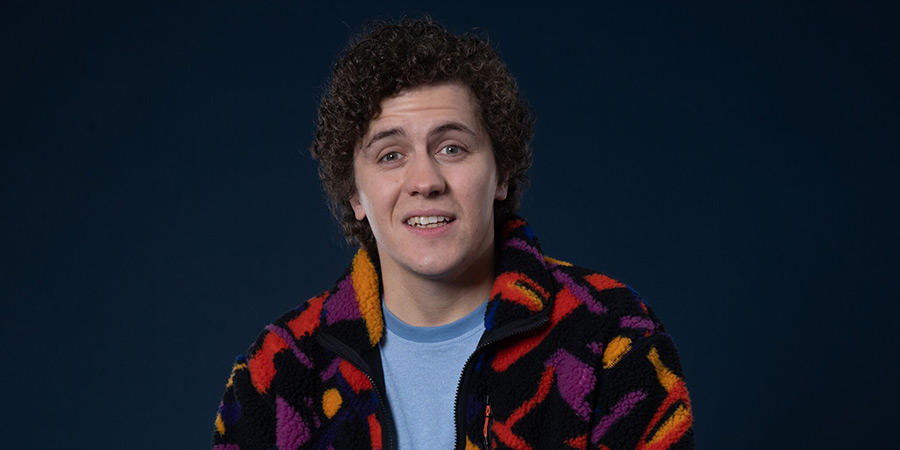
What is Big Boys and who is Jack?
Big Boys is a show written by Jack Rooke about growing up, dealing with grief, the loss of a parent, and also going to university, making friends and discovering his sexuality. It's a really cool coming of age story. The real Jack is super confident, I play him when he was younger when he was still trying to learn about himself and come out of his shell.
Jack finds himself in unfavourable situations quite a lot - what do you put that down to?
Yeah, and I think he deals with them pretty terribly! It's the beauty of Jack's writing - he tells those wacky stories so well. I'm pretty sure half of them are true, like my curls getting stuck in Yemi's piercing, I think that was a guy in real life. But it's so much fun to perform those awkward scenarios. Like the ashes on the penis scene, on the day we only had one go at it to get it right because they can't clear up all those ashes and so we had to nail it. Luckily, we did!
Jack and Danny's friendship is a core part of the show. What do you think makes their relationship so special?
I think their open mindedness is so special and lovely to see, they're so accepting of one another even though they're complete opposites. It's nice to see them look out for each other, especially with those sensitive topics and the tough things they're going through - Jack helping Danny with his mental health, checking in and looking out for him. And Danny helping Jack with the grief of losing his dad and of course coming out and helping him on his on journey which is sweet.
What can we expect from Series 2 of Big Boys?
Bigger and better, so much entertainment. More funny stuff to look forward to but also getting to know the other characters and seeing the layers to them. It's just a great show and I can't wait for everyone to see it.
What is your favourite line from the show?
I quite like when Jules is talking about paninis, but she calls them punanis and Danny's like "Ooh yeah I'll have a punani" that was funny, I enjoyed that one.
Jon Pointing
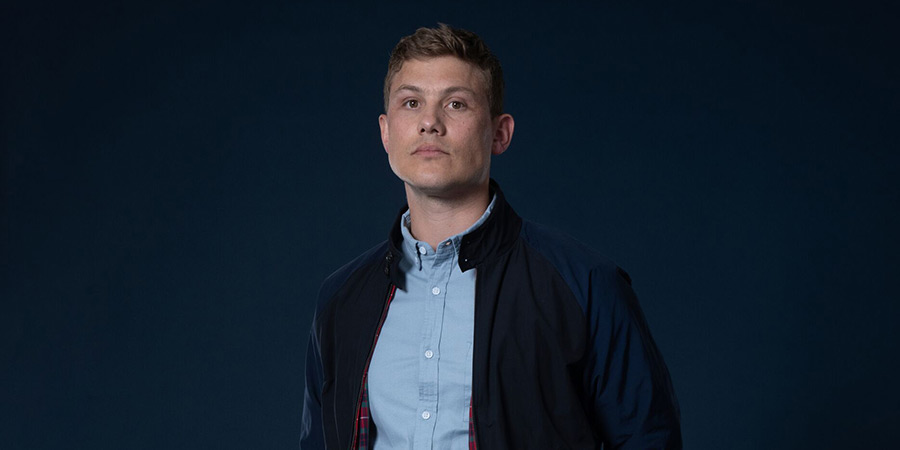
What is Big Boys and who is Danny?
Big Boys is a semi-autobiographical comedy by Jack Rooke, about him losing his dad, starting university, and dealing with his sexuality and his identity. He's thrown together with my character, Danny, who at first seems like this uber lad who just wants to get off with girls and drink and party, they seem like opposite energies but quite quickly form a bond and a friendship that is the central theme of the show - along with lots of crazy antics around being at uni.
We get more of an insight into Danny's upbringing and potentially some of the reasons that he struggles with his mental health. How was that for you and your journey playing Danny and what do you think people watching will take from it?
It was really nice; everyone's storylines go into more detail this series, so it was good to be able to play that. I think a lot of people were heartened by his relationship with his nan and that's why he is how he is with Jack. In a similar way, I hope that some of the stuff you see with his family in the second series will do the same thing and give people that context. There are some scenes with his dad, where you see the other side of his personality, his feelings, and thoughts. He's got this love, support, and bright side of his life for his nan and then there's this fear and all his trauma wrapped up in this other character.
This series continues to explore universal issues that you wouldn't associate necessarily with comedy (broken homes, grief, trying to find somewhere to live in a housing crisis) why do you think it works?
I think it works because Jack primarily writes about people that love and care about each other and a lot of these topics are very close to his heart. He's not tackling them or talking about them in a finger wagging way. And it's not about judging anyone for not having that experience or not knowing about it. It's like, look, this is a person who happens to be struggling with mental health, and this is a person who's going through the difficulties of coming out and they both do things like sh*t themselves, get wasted on nights out and argue. It all comes from a good, warm place - you can talk about or make comedy out of anything if that's your starting point. I think as soon as you're trying to make fun of people or you're trying to make a point that's when it doesn't work.
We see how important the gang is to Danny, would you say those relationships become his chosen family?
Yeah, he really needs and wants that family unit, it's something that he's obviously lacked. This group happen to be a bunch of students, but they're really important to him. Danny is Mr Positive, that's his default setting, he says 'it's going to be good', even if he doesn't believe it, he's trying to convince himself which is obviously part of the problem, but I think it's the thing that the gang find both irritating and endearing about him.
What is your best memory from filming Big Boys Series 2?
It's hard to pick out one because the whole experience was amazing. And I really tried to savour every bit of it. I had some really nice scenes with Dylan, but also Camille and Izuka and Olisa so that was great. We're so lucky because not every job is like this, I really tried to savour the fact that this filming is not going to last forever.
Izuka Hoyle
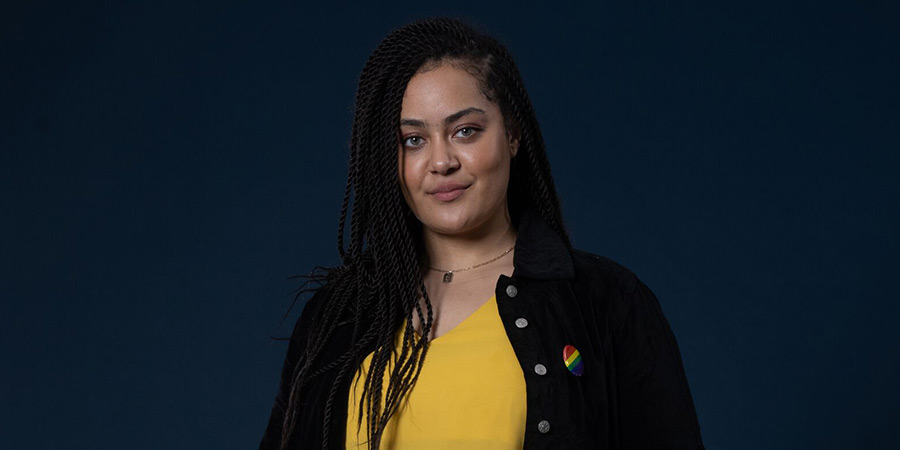
What is Big Boys and who is Corinne?
For me, Big Boys is my favourite job I've ever done in my life - it's just glorious! Corinne is in her early 20s, studying a journalism degree, which she is obsessed with. She's a hard worker, a bit of a head girl but also a bit of a loser in the best possible way. This season you get to see more of her personal side. I think she relaxes a bit more and we start to venture more into her intimate life. We get to find out more about her background, where she's come from and how she navigates relationships - and the darker side of relationships too. She's still trying to be a support system and shoulder for Danny to lean on but there's a focus on herself and her journey.
Who wears the trousers in the group, Corinne or Yemi?
The beautiful thing about Yemi and Corinne is, in Series 1, you see them separately - they're both in the gang but we don't really see them interact as much. So, when Jack put them together, I was super excited. They've almost met their match, if Yemi says something to Corinne, she might give him a little eye roll, but she's still there like 'fair enough mate'. She really respects him, and she knows he's done the work. Unlike the boys (Danny and Jack), who she loves and adores but they are still just trying to figure out what it is. There's lots of bickering between Yemi and Corinne but in a really loving brotherly sister way.
Would you say we get to see a softer, more vulnerable side to Corinne as the series goes on?
For sure, I also think the reason you see more of her vulnerabilities is because Jack is so great with making characters 3D. It's funny to see a woman who is very much on these boys arses all the time and can talk about sex on one hand but also is going to hand her dissertation in on time and come for them when they're not doing the bare minimum work or keeping themselves clean. It's good to see a clash of the stereotypes of what is to be a geek and she challenges that. It's because of the things you find out along the way and especially in episode six, that we see a more vulnerable side - it helps us understand why she is the way she is, why she does the things that she does and why she has the opinions that she does. Sometimes that vulnerability is behind a closed door, as the audience you're privy to it but by episode six, I think all the characters show their vulnerability to one another.
'Friends are the family you choose' is a core theme of the series, what do you think has brought and kept the gang together?
When we meet them at the beginning, they are all so different. We see them struggle to fit into wherever the conversation is or whatever is going on. Take Danny and Corinne, there's no way these two people are going to be able to hang out, let alone have some kind of intimate relationship. But I think they're bonded by the fact they are all slightly different and they're all in touch with their emotional intelligence which comes from some kind of adversity. It is a real funny mix, at first when you meet them on paper you're thinking, how do you make this work? I think it's also that beautiful thing of chemistry. I've got pals that I'm like 'never in a million years would you put the two of us together'; the gang just have a chemistry and energy between them that works. It's the same for us off screen, we're a real bunch of different types of people and we've absolutely fallen in love with each other.
What's it been like making this series?
Jack is one of the best writers we've seen, this is just the beginning for him, I think everyone can agree to that. What's even better is that you're reading scenes that you know he's been sat in his room thinking 'what can I make Izuka do on set that I can just sit back and laugh at?' such as the ice bucket challenge. Jack was present in my eye line for all of these scenes with the camera up here, tears streaming down his face. It's so fun, if I know someone's got a certain scene coming up, I'll be squeezing myself into that room. Even on the scenes that are quite tough because the calibre and level of people in this show is so high, anytime I can have a little peek and learn a little something from someone - everyone's doing such unbelievable work.
What can people look forward to?
Big laughs and lots of stupid situations that your favourite characters get into. I also think they can look forward to being seen. Yemi has some very important stuff to say, especially for the black queer community - I'm excited for them to have a voice and for them to feel seen. A massive part of the fan base are queer people, people that have gone through bereavement or people that are suffering with their mental health. I'd say those people specifically feel very seen when they've watched Big Boys, maybe triggered but also healed because Jack does this gorgeous thing where he will have you giggling so you open yourself up to the show and then suddenly you're put in a situation that you maybe didn't think you were going and you're crying your eyes out, but instead of then leaving you there, he always holds his audiences and makes sure they're alright before he pops them back and closes the show.
Olisa Odele
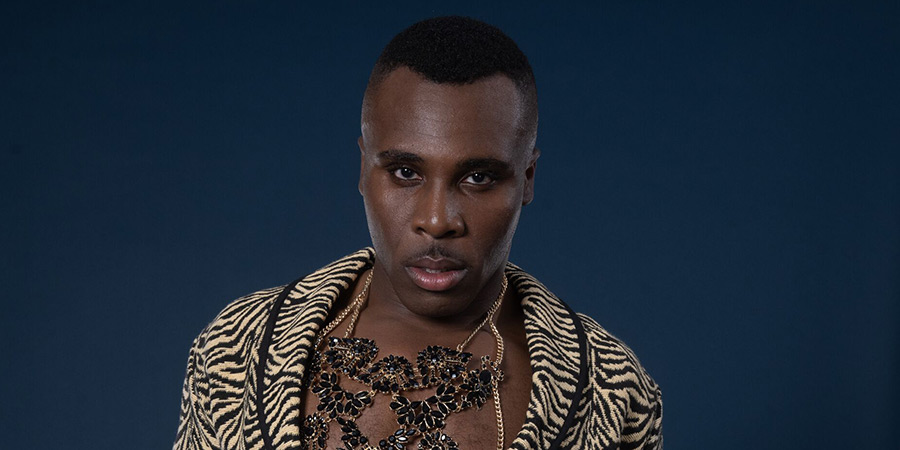
What is Big Boys and who is Yemi?
I'm sure we've all been answered this question in different ways. For me, Big Boys is about unlikely friendships. These are people who without the glue of Jack or the situation of university, would not have become friends. But because of those things we get to see them fall in love, do life with each other and all the deliciousness that brings. Yemi is very confident in his identity and sexuality, he's an ambitious fashion student and president of the LGBTQ+ society. He's always doing his hustle while socially and emotionally investing in new people, I think each episode he invests a little bit more.
Yemi reveals things about himself in moments to help someone. There are three different moments in the show where he personally reveals things, he won't be like 'oh, I went through this and here's my story'. He doesn't need to do that. He's so beyond that. There's precedent, in a moment where it feels like - 'when I explain this part of myself, you understand this about yourself' especially with Jack and Danny. I feel like his season one relationship with Jack was like an advisor in the sense.
Do you think Yemi feels a sense of responsibility to guide Jack after coming out?
I think he does, but not in the way that I'm going to hold your hand, I don't think that's useful. It's more I need you to go and have experiences, I've given you my thoughts, now go and get some d*ck. Like you're an attractive Caucasian white boy, the world is built for you. The things that Yemi has been through being a black queer means that there are parts of Jack's journey that are different. There's definitely empathy and support but it's not the same experience. It's very much like you go do your thing and flirt with a cute guy. Even though he's giving off the exterior like I don't care for your business, he's watching out for what choices Jack is going to make, I feel like if Jack went too far Yemi would be the first person to question it.
And what about the dynamic with the other characters?
Some of the stuff that Corinne goes through are not things that Yemi has. It's the first time you see him walking through things that he's not really experienced himself. He doesn't want to say the wrong thing. It is very much uncharted territory which he takes very seriously and wants to get it right. He wants to support her. And when it comes to the whole gang - I think they all either needed to find a family or understand the value of family. In the same way that the character Jack brings us together, the real Jack has brought all of us together in the same way, there's a real friendship amongst the cast in this show which is unlike anything I've ever experienced before. There's real support going on behind the camera that carries through on screen. We are so connected to the vision and the story and seeing each other's greatness. I think the interpersonal relationships amongst us all that we've developed over the years really show, add that to the writing, and the story at the core of this show, where you have something that really matters to Jack, but also matters to all of us - it makes a real difference.
What's your standout moment from filming Big Boys?
I remember one day filming a scene with Harriet, Izuka, Camille and Annette and I just stopped acting, I was just watching them like, f**king hell - they are beasts, I'm so lucky to be here watching them, watching their artistry - it makes you want to be your best. There's also a scene we filmed in the blue shed where the bloopers that day are outrageous. Like we had to stop, we really stopped filming which hasn't happened because you know, we're professional, but there were things that happened on that day, things that were said... I'm begging, release the blooper reel. There's a particular scene with Dylan, Jon, and Izuka in the blue shed that was one of the funniest days I've ever had on set. And I think people need to see the unedited version. I want to have it out there so I can have it and look at it for the rest of my life and never forget that day.
Help us publish more great content by becoming a BCG Supporter. You'll be backing our mission to champion, celebrate and promote British comedy in all its forms: past, present and future.
We understand times are tough, but if you believe in the power of laughter we'd be honoured to have you join us. Advertising doesn't cover our costs, so every single donation matters and is put to good use. Thank you.
Love comedy? Find out more
